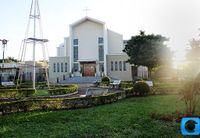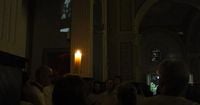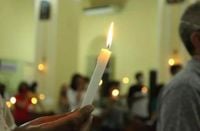The Holy Week celebrations in Rio de Janeiro are set to engage the community with a series of masses and processions across various neighborhoods. This year, the program is particularly highlighted by the visit of the original cross of the First Mass in Brazil, which will be at the Sanctuary of Christ the Redeemer on Saturday, April 19, 2025. The festivities will continue into Easter Sunday, April 20, with solemn masses and social actions aimed at assisting vulnerable populations.
On Saturday, the schedule includes significant events at various churches. The Basílica Nossa Senhora de Lourdes will remain closed until 6 PM, with the Soleníssima Missa da Vigília Pascal (Easter Vigil Mass) commencing at 7 PM. At the Paróquia Divino Espírito Santo, community temple washing will take place at 9 AM, followed by a Vigília de Páscoa at 7 PM. The Sanctuary of Christ the Redeemer will host a Vigília Pascal starting at 5:30 PM, featuring the cross from the First Mass, which is currently on a pilgrimage from the Tesouro-Museu da Sé de Braga in Portugal.
Additionally, the Catedral Metropolitana de São Sebastião will hold its Solene Vigília Pascal at 6 PM, celebrated by Cardeal Orani João Tempesta. Other notable events include the Bênção do Fogo at the Igreja Matriz de Nossa Senhora da Conceição Aparecida at 7 PM, and the Basílica São João Batista da Lagoa will also hold its Vigília Pascal at the same time. The Paróquia São José e Nossa Senhora das Dores will conduct a mass at 7 PM, while the Basílica Santa Teresinha will have an Oração das Laudes at 8 AM followed by its own Vigília at 6:30 PM.
As the celebrations continue into Easter Sunday, the Basílica Nossa Senhora de Lourdes will have masses at 7 AM, a solemn Easter Mass at 10 AM, and another mass at 6 PM. The Paróquia Divino Espírito Santo will offer masses at 7:30 AM, 9:30 AM, and 6 PM. The Sanctuary of Christ the Redeemer will have masses at 11 AM and 2 PM. The Catedral Metropolitana de São Sebastião will also host a special Easter Mass at 8 AM, which will include the Cruz do Descobrimento and outreach to the homeless community, followed by a communal lunch at noon.
Throughout the day, various parishes will conduct multiple masses, including the Igreja Matriz de Nossa Senhora da Conceição Aparecida, which will celebrate solemn masses at 7 AM, 9 AM (children's mass), 11 AM, and 6 PM. The Basílica São João Batista da Lagoa will have its Easter Resurrection Mass at 8 AM, 9:30 AM, 11 AM, 5 PM, and 6:30 PM. The Paróquia São José e Nossa Senhora das Dores will celebrate masses at 8 AM, 10 AM, and 6 PM, while the Basílica Santa Teresinha will have services at 8:30 AM, 11 AM, and 6:30 PM.
In addition to the spiritual observances, social initiatives will be a key aspect of the celebrations. The Catedral Metropolitana will host a communal lunch for the homeless following the Easter Mass, further emphasizing the church's commitment to social responsibility and community support.
The Holy Saturday, known as Sábado de Aleluia, is steeped in tradition and spiritual significance. It is a day that marks the transition from the solemnity of Good Friday to the joy of Easter Sunday. The day is characterized by the Vigil of Easter, which includes the lighting of the Círio Pascal, symbolizing Christ as the light of the world. This moment is central to the celebration, renewing the promises of baptism for the faithful.
Padre Expedido Santos, a parish priest, explains that the term Sábado de Aleluia is tied to the victory of Christ over death. During Lent, the word 'aleluia' is not spoken in masses, as it is a joyful expression reserved for the Easter celebration. The priest highlights that the lighting of the Círio Pascal is not just a ritual, but a profound moment that signifies the resurrection of Christ and the renewal of faith.
In some communities, the tradition of malhar Judas, or punishing a doll representing Judas Iscariot, is practiced. This custom, while not officially part of the Catholic liturgy, symbolizes the betrayal of Christ and serves as a reminder of the consequences of treachery.
The Vigília Pascal, often referred to as the mother of all vigils, is marked by extensive liturgy, including readings from the Bible that recount the story of salvation, interspersed with psalms and prayers. The ceremony culminates in the Eucharist, signifying the ultimate celebration of resurrection and renewal.
As Holy Week unfolds, the rich tapestry of rituals, prayers, and community gatherings in Rio de Janeiro reflects the deep spiritual significance of these days for Catholics. The celebrations not only honor the resurrection of Christ but also foster a sense of community and support for those in need.
In conclusion, the Holy Week program in Rio de Janeiro offers a profound opportunity for reflection, celebration, and community engagement, embodying the spirit of Easter through both solemn rituals and joyful gatherings.







